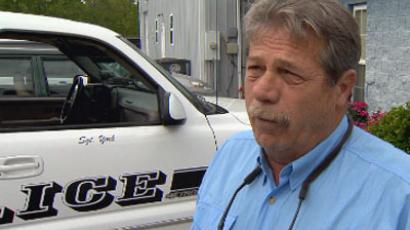Nevada sheriff defends confiscating thousands of dollars from innocent drivers

The top sheriff in a rural part of northern Nevada told residents this week that one of his deputies acted appropriately by confiscating tens-of-thousands of dollars and a handgun from two men who were never charged with crimes.
Humboldt County Sheriff Ed Kilgore defended his department during an open meeting on Tuesday this week in Winnemucca, NV, where around 40 residents of the region turned up to talk to law enforcement about two headline-making lawsuits that have propelled the area into the national spotlight as of late.
The federal suits — both filed last month in United States District Court — allege that Deputy Lee Dove of the Humboldt County Sheriff’s Office acted unlawfully when he pulled over two drivers in September and December of last year for routine traffic violations, only to confiscate large sums of money and, in one instance, a handgun, without ever charging either individual with a crime.
In each case, the plaintiffs were stopped by Dove for minor infractions and eventually released without being booked. Both times, however, he came upon large amounts of cash in their vehicles and confiscated it by evoking a controversial “civil forfeiture” provision that lets law enforcement take money if an officer thinks it was either obtained illegally or will be used for illicit means.
Both cases attracted the attention of Associated Press reporter Scott Sonner, who profiled the lawsuits earlier this month in a story that set the stage for Tuesday’s meeting in the county center.
“Two men who were traveling alone through the high desert last year offer strikingly similar accounts of their stops by the same Humboldt County deputy near the town of Winnemucca, about 165 miles east of Reno,” Sonner wrote last week. “Neither search produced drugs or an arrest, but in one case Deputy Lee Dove took a briefcase filled with $50,000 and in the other he seized $13,800 and a handgun, according to the lawsuits filed in US District Court in Reno.”

Attorneys for Tan Nguyen, 37, filed their suit on February 12, and in it they alleged that Dove pulled over their client the previous September for driving 78 miles-per-hour in a 75 mph zone.
“Dove stopped Plaintiff in a ‘profile stop,’ suspecting that Plaintiff was transporting illegal drugs, which he was not,” they wrote. Upon inspecting the vehicle, however, the deputy came across a briefcase containing $50,000 in US currency and two cashier’s checks, which were promptly confiscated.
“Plaintiff was neither arrested nor cited for any violation of the law in relation to this encounter with Dove,” attorneys wrote. “Rather, Dove gave the plaintiff only a warning.”
According to the suit, Dove told Nguyen that he would be arrested unless he “got in his car and drove off and forgot this ever happened.” The fifty-grand — winnings from a Nevada casino, according to Nguyen’s attorneys — was never returned.
Twelve days after Nguyen’s attorneys filed suit, lawyers for Colorado resident Ken Smith filed a similar claim in District Court. Again, Dove is accused of having pulled over a vehicle for an alleged speeding violation, but this time he momentarily detained the driver after his name matched that of a man wanted by the authorities.
“The warrant was for a Ken Smith who was identified on information available to the Deputy as African-American with a different birth date,” the suit claims. “Plaintiff is Caucasian and has a different birth date than the Ken Smith on the warrant.”
Smith’s attorneys say their client should never have been stopped unless there was probable cause for speeding, and certainly shouldn’t have had to surrender the $13,800 in cash he had in the vehicle or a .40 caliber handgun.
Attorneys for both plaintiffs say their clients’ Fourth Amendment-protected right to be free from unlawful searches and seizures was violated by Dove. In the case of Nguyen, his lawyers say Dove conducted the search without either the plaintiff’s consent or probable cause, but instead “in bad faith, transcending the scope of authority granted to them, and each of them.”
“It’s like Jesse James or Black Bart,” his lawyer, John Ohlson, told the AP’s Sommer last week.
In the Smith claim, lawyers say Dove acted without reasonable suspicion or probable cause by conducting the stop and confiscating property, and accuse him of causing their client “emotional distress, mental anguish, embarrassment, humiliation, harm to reputation, fear of law enforcement, loss of $13,800.00 in cash and the use thereof, loss of the firearm [and] its value and enjoyment of the use thereof.”
“It’s pretty scary to be out in the middle of nowhere on the side of the road and be told all your stuff is going to be taken away,” his attorney, Jeff Dickerson, told Sommer.
Reporting from Winnemucca this week, the journalist heard similar complaints from the few dozen Humboldt County residents who raised their voices.
"The majority of the community is extra concerned," long-time area school teacher Bob Pace testified at the town hall meeting. "You have a huge job and do it well," he told Sheriff Kilgore — who is named as a defendant in the Nguyen lawsuit. "But the perception is an individual on the road is stopped, and they are not cited. They are not arrested, but their cash or their weapons are confiscated."
"There's no citation," another said, according to Sommer. "But now you are guilty until you prove yourself innocent."
As far as Sheriff Kilgore is concerned, though, his officers are acting fully in compliance with the law.
"What I'm hearing on the street is that we stop you and ask you for your license, registration and your insurance, and how much money do you have? That simply is not how it is ever done," he insisted on Tuesday, Sommer said.
Civil forfeiture was for sure a “hot topic,” Kilgore admitted, but according to the AP he justified it by saying that Humboldt County abides by a lot of the same rules as law enforcement agencies elsewhere in the US.
Indeed, RT has reported in the past that similar incidents have unfolded everywhere from Tennessee — where one man had to hand-over $22,000 in cash he planned on paying for an automobile he purchased online — to Virginia, where a Pentecostal church secretary was forced to surrender $28,500 worth of donations after being stopped for speeding.
When the New Yorker’s Sarah Stillman reported on the Virginia incident last year, she said the basic principle behind law enforcement’s conduct was “appalling.”
“It enables authorities to confiscate cash or property obtained through illicit means and, in many states, funnel the proceeds directly into the fight against crime.”
Back out west, Sheriff Kilgore of Humboldt County is following suit: a statement out of the Sheriff’s Office last March acknowledged that around $180,000 in cash had been seized from suspected criminals in the previous two years.
According to Kilgore’s “State of the Sheriff’s Office” for 2013, his department put together a conference attended by over 150 law enforcement professionals from across the US, “funded by asset and money seizures done throughout the last couple of years during drug interdiction stops in our county.”
“Asset forfeiture today, the way it exists federally, as well as in many states, is an institutional corruption,” Judge Jim Gray, a justice with more than 30 years of experience on the bench in California, told Forbes. “None of the [forfeiture] money should go to law enforcement. That provides them an inappropriate incentive,” he said.
For now, though, such a system is perfectly legal by the standards in place in Humboldt County.
"It's a slippery slope of evidentiary standards ... but it's out there. It's lawful," ex-Humboldt County public defender Robert Dolan told the AP. "The deck is stacked against the citizens. And I'm not happy about it. But this system was not invented by Sheriff Kilgore."













